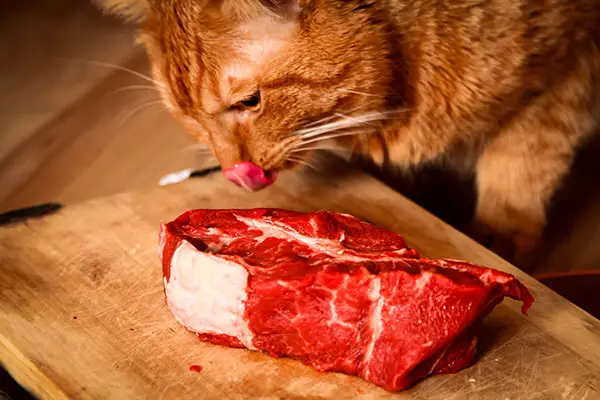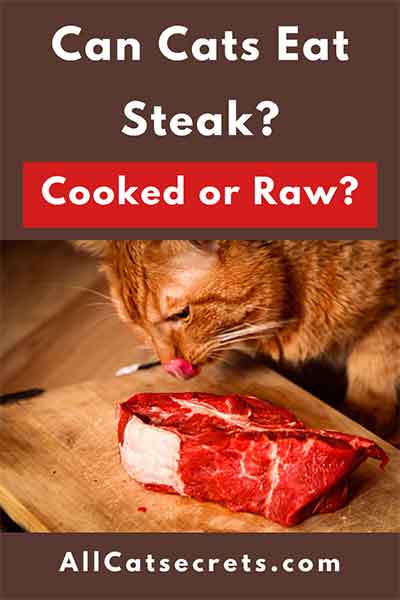Many people associate steak (and meat in general) with various chronic diseases, including heart disease, obesity, and certain cancers.
Well, for the most part, the health concerns associated with eating steak are well-founded. There’s no shortage of research suggesting that uncontrolled consumption of meat products increases the risks of numerous chronic illnesses.
But is the same true for cats? Can cats eat steak?
The simple answer is yes, cats can comfortably eat steak. While medical researchers generally discourage red meat for humans, the same meat seems to be perfectly fine for our feline friends.
So, can cats have steak?
As we’ve just mentioned, steak is entirely safe for cats. Plus, it comes with several health benefits that your kitto can enjoy.
But as with any food, there are a few precautions to take when feeding steak to your feline friend.
This post shall highlight some of the common health benefits of steak for cats, as well as a few potential risks.
Table of Contents
But Just What Is Steak?
Before we proceed to highlight some of the health benefits and possible dangers of steak for cats, it would be great to start by understanding what steak is.
The term ‘steak’ generally refers to meat that’s sliced across the muscle fibers of an animal. Steaks usually include bones. However, some steaks may not feature any bones in them.
Most steaks are prepared by grilling. But you can also opt for other cooking methods, including pan-frying, roasting, or boiling. In the case of cats, steak is best served raw. More on that later on.
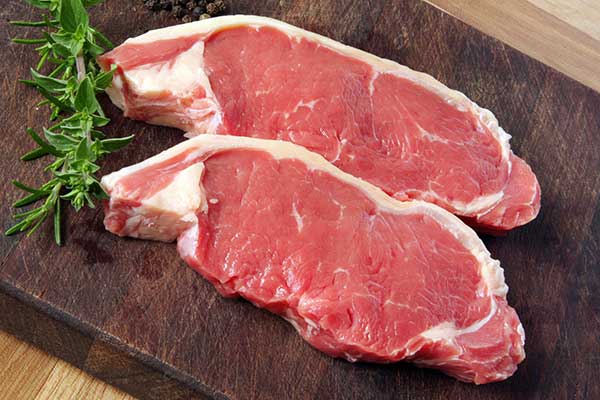
The warm, red center of steak, which oozes the juicy, meaty flavor, is known as medium-rare steak. You might be wondering, can cats eat medium-rare steak?
Now, most references to medium-rare steak are usually made with regards to grilling steak. According to culinary experts, medium-rare steak is reached when you grill the meat at a temperature between 130 and 135 degrees Fahrenheit. This is usually the temperature at which the proteins in the steak begin to denature, resulting in meat with the right amount of tenderness.
As you shall find, raw steak seems to be the better option for cats than grilled steak. So, cats can eat medium-rare steak as long as you serve the steak raw.
- Rice and oat meal are easily digestible and gentle on the digestive system
- High protein formula, with real lamb as the first ingredient
- Fortified with guaranteed live probiotics for digestive and immune health
Last update on 2024-07-10 / Affiliate links / Images from Amazon Product Advertising API
Understanding a Cat’s Nutritional Requirements and the Health Benefits of Steak
Cats are classified as obligate ‘true’ carnivores.
As obligate carnivores, cats can thrive exclusively on animal protein. In fact, a cat’s body is biologically designed to only process foods that are rich in animal protein. Which explains why your feline friend will do just fine on a steak-based diet.
Now, there are numerous benefits of protein-rich foods like steak.
First up, protein forms the building blocks of an animal’s organs and tissues, which, in turn, increases muscle mass and strength.
Protein is also famous for its ability to curb appetite and hunger pangs by creating a feeling of fullness for longer. That explains why, compared to their herbivorous counterparts, carnivorous animals like cats don’t have to eat multiple times a day. A heavy meal can last them for several days or even a week.
Protein’s appetite-suppressing abilities have an indirect, positive effect on weight management. So, contrary to popular belief, steak might actually play a vital role in keeping your cat free from weight-related diseases like obesity.
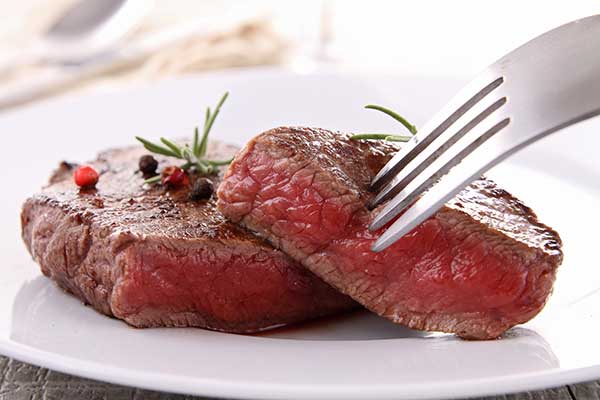
But protein isn’t the only essential mineral in steak. As with all kinds of lean meat, steak also boasts significant levels of iron, zinc, and phosphorus, as well as B-complex vitamins like Vitamin B6, Vitamin B12, niacin, and riboflavin.
While each of these minerals contributes to the overall health and growth of your cat, Vitamin B12 gets a special mention.
Also known as cobalamin, Vitamin B12 promotes the health of your cat’s nervous, digestive, and immune systems. A deficiency in Vitamin B12 might trigger a variety of symptoms, including vomiting and diarrhea, lethargy, and weight loss.
While cats can synthesize some minerals on their own, they’re unfortunately incapable of producing cobalamin. Instead, they absorb the mineral from the foods that they eat, which makes it necessary to supplement their diets with steak and other cobalamin-rich foods.
However, the fact that cats can eat steak doesn’t mean you should offer steak to your kitto with careless abandon. As you shall find in the next session, there are inherent risks associated with feeding steak to cats.
Risks of Feeding Steak to Cats
The risks of feeding steak to cats depend on four crucial factors, including:
- Whether the meat is raw or cooked,
- The age and general health condition of the cat,
- The presence of bones in the steak, and
- How much of the meat you give your kitto.
- Real turkey is the number 1 ingredient in this Purina indoor cat food to help provide the protein she needs for strong muscles,...
- High protein cat food kibble with 10 percent less fat than Purina ONE Tender Selects Blend With Real Chicken helps her maintain a...
- A SmartBlend of fiber-rich nutrition in weight control dry cat food helps minimize hairballs, and four antioxidant sources support...
Last update on 2024-07-10 / Affiliate links / Images from Amazon Product Advertising API
Raw versus Cooked Steak: Which Is Better for Cats
Many pet parents would find it natural to offer cooked steak to their cats.
But can cats eat cooked steak?
Yes, cats can eat cooked steak. You only have to ensure that the meat is prepared under conditions considered safe for feline consumption.
That means cooking the meat in moderate heat; high enough to kill any bacteria that might have infected the meat and low enough to keep the essential minerals intact.
Most importantly, any steak that you intend to feed your cat shouldn’t be cooked with too much fat. Note that steak is already a fat-rich food. Therefore, adding more fat to it might trigger a host of health issues for your cat, including high cholesterol levels, heart disease, obesity, diabetes, and pancreatitis.
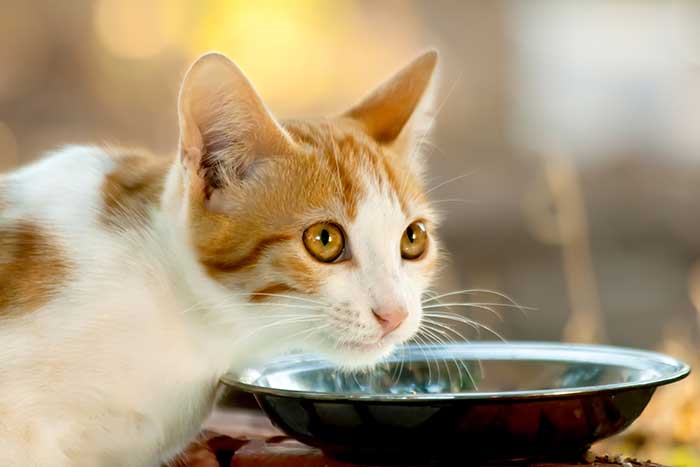
Besides fats, also refrain from feeding your cat steak that contains high amounts of salt or spices like onions and garlic. While these ingredients are normally added for flavor enhancement, exposure to high levels of salt or spicy foods might be injurious to your cat.
Can cats eat raw steak?
Although cooked steak is okay for cats, the animal is better off with raw steak. In fact, your cat will appreciate raw as opposed to cooked steak. Remember that before domestication, cats hunted down and consumed their prey raw. Plus, raw steak has all its nutritional elements intact.
However, there are a few precautions to take before feeding raw steak to cats.
First, ensure that the meat is fresh and free from common bacteria like Salmonella and E. coli.
Also, you should preferably offer boneless steak to your cat. Now, you may have wondered, can cats eat steak bones?
While bones in raw meat are stronger than those in cooked meat, they’re not completely free from splintering. The splinters can cause serious lacerations to your cat’s mouth and digestive tract, in addition to posing choking hazards.
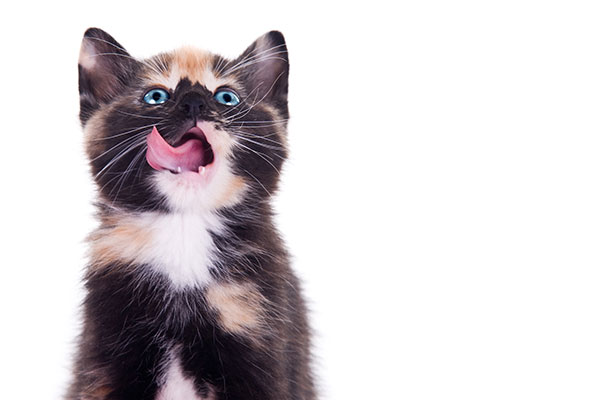
Is Age A Factor?
Yes, age is a major factor when considering feeding steak to cats.
So, can kittens eat steak? And what about older cats, can older cats eat steak too?
Kittens have an underdeveloped immune system. So, they’re more likely to suffer the common side effects of steak for cats.
On the flip side, kittens can also benefit immensely from many of the essential minerals in steak.
So, your best bet is to feed very small amounts of steak to your kitten. The same applies to other cats with generally suppressed immunity, such as older cats, sick cats, and expecting cats.
? Note that a medium-sized, healthy, and mature cat can live on less than 300 calories per day. And a single three-ounce serving-size of plain steak contains as many as 178 calories. That underscores the importance of exercising caution when feeding steak to your cat.
- Works as a dog food topper - For pet parents looking for an alternative to capsules, raw treats, or soft chews, all it takes is a...
- A tasty & body nourishing treat for cats & dogs - Essential fatty acids for a healthy coat.
- Powerful Omega Fatty Acids - This premium fish oil liquid formula is loaded with the healthy Omega-3 fatty acid (with epa and dha)...
Last update on 2024-07-09 / Affiliate links / Images from Amazon Product Advertising API
So, Can I Feed My Cat Steak?
Yes, you can comfortably feed steak to your cat and for the most part, there are no immediate health concerns to be worried about. Since steak is basically meat and cats are obligate carnivores, it only means that your feline friend can thrive happily on a diet of steak.
However, moderate the amounts of steak that you feed your cat. That way, you’ll help the animal to stay safe from some of the common health risks associated with steak consumption, including cholesterol buildup, heart disease, and obesity.
Checkout Our Favorite Cat Products
1. Best Online Course For Cat Parents
Our favorite: The Cat Language Bible (How to Finally Understand And Speak to Your Cat) – A new form of cat to human communication that many cat owners have dreamed about… but few have actually thought possible.
2. Best Vacuum to Tackle Pet Hair
Our favorite: ORFELD Cordless Vacuum – Engineered for homes with pets. With features and tools that dig out dirt, hair and allergens everywhere your pet gets.
3. Best Immune Support For Cats
Our favorite: Tomlyn Immune Support – Best Supplement for Cats and Kittens.

